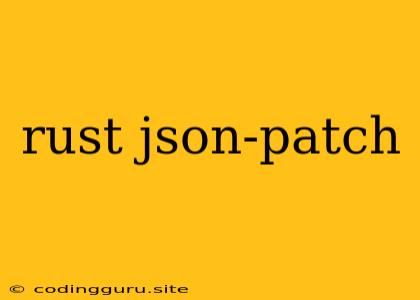How Can Rust Help You Efficiently Apply JSON Patches?
JSON Patch is a standard way to describe changes to a JSON document. It's a powerful tool for managing data updates, especially in applications with frequent data modifications. Rust, with its focus on speed, safety, and control, provides an ideal environment for efficiently handling JSON Patch operations. This article will delve into how Rust can be leveraged to make working with JSON Patch a seamless and efficient process.
What is JSON Patch?
JSON Patch defines a set of operations that can be applied to a JSON document to modify its structure and values. Each operation specifies a target location within the document and the desired change, like adding a new field, updating an existing value, or removing an element.
Here's a basic example:
[
{
"op": "replace",
"path": "/name",
"value": "John Doe"
},
{
"op": "add",
"path": "/age",
"value": 30
}
]
This patch applies two operations:
- "replace": Changes the value of the "name" field to "John Doe".
- "add": Adds a new field called "age" with the value 30.
Why Use Rust for JSON Patch?
Rust offers a number of advantages for working with JSON Patch:
- Performance: Rust's compiled nature and focus on memory safety contribute to excellent performance, crucial when dealing with potentially complex JSON documents and multiple patch operations.
- Safety: Rust's strict type system helps prevent runtime errors, making your JSON Patch logic more reliable and less prone to bugs.
- Control: Rust allows for precise control over memory management and data structures, ensuring efficient and optimized handling of JSON Patch operations.
- Rich Ecosystem: Rust has a vibrant ecosystem with libraries specifically designed to handle JSON and JSON Patch, simplifying your development process.
How to Implement JSON Patch in Rust
Rust provides various libraries to streamline working with JSON Patch. Here are some popular options:
jsonpatch: A popular library offering comprehensive JSON Patch implementation with support for all standard operations.serde_json: A highly efficient JSON serialization library that can be used to convert your JSON data into Rust data structures for easier manipulation with JSON Patch operations.
Let's illustrate with a simple example:
use jsonpatch::{Patch, Apply};
use serde_json::from_str;
fn main() {
let json_data = r#"{"name": "Alice", "age": 25}"#;
let patch = r#"[{"op": "replace", "path": "/name", "value": "Bob"}]"#;
// Parse the JSON data and the patch.
let json: serde_json::Value = from_str(json_data).unwrap();
let patch: Patch = from_str(patch).unwrap();
// Apply the patch to the JSON data.
let result = patch.apply(&json).unwrap();
// Print the updated JSON data.
println!("{}", result);
}
This example demonstrates how to apply a simple JSON Patch to modify the "name" field. The jsonpatch library handles the application of the patch, and serde_json facilitates the conversion between JSON strings and Rust data structures.
Advanced JSON Patch Scenarios in Rust
Rust can handle complex JSON Patch scenarios:
- Conditional Operations: Rust allows you to define custom logic to apply patches based on specific conditions within the JSON data.
- Batch Processing: Rust's concurrency features allow you to process multiple JSON Patch operations concurrently, improving performance for large datasets.
- Error Handling: Rust's strong error handling mechanisms ensure your code gracefully handles potential errors during patch application, promoting code robustness.
Conclusion
Rust's combination of performance, safety, and control makes it an excellent choice for implementing JSON Patch operations efficiently. The robust ecosystem of Rust libraries simplifies the process, enabling you to build reliable and performant applications that effectively manage JSON data changes. By leveraging Rust's features, you can confidently handle complex JSON Patch scenarios with speed and precision, ultimately enhancing the efficiency of your data management workflows.
